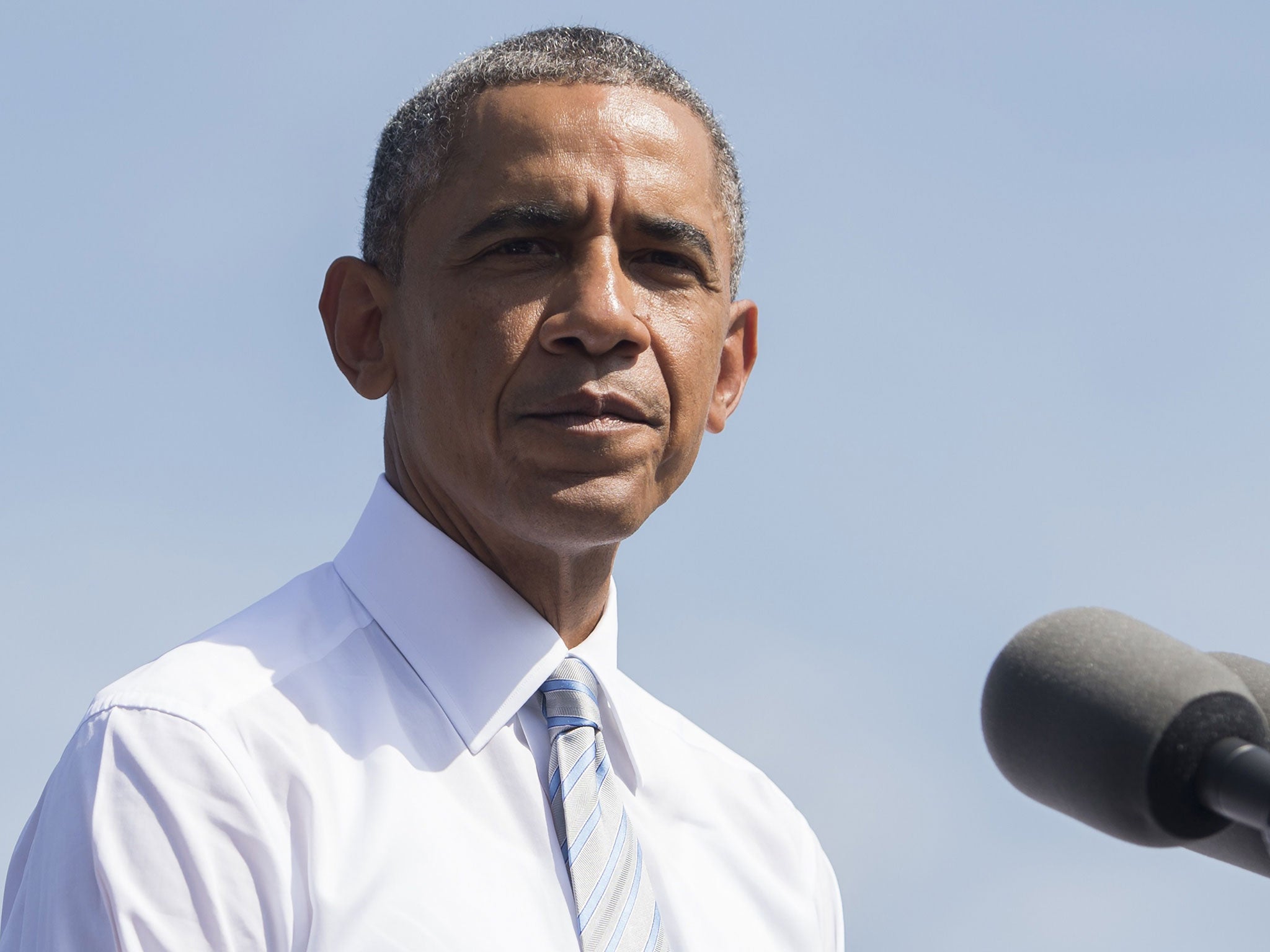US midterms: Democrats spurn 'toxic' Barack Obama in their election campaigns as President's popularity nosedives
President to make first foray into campaign in support of Connecticut candidate

With voting in America’s midterm elections now barely three weeks away and the outlook bleak for Democrats, an isolated President Barack Obama is at last set on Wednesday to make his first substantial foray on to the battlefield in support of Governor Dan Malloy, of Connecticut, who is seeking re-election.
The loneliness of Mr Obama has seemed only to deepen in recent days as candidates for races far more important to the party than Governor Malloy’s in Connecticut have continued to spurn any and all suggestions of his campaigning beside them and senior members of his own party have felt more willing to criticise him openly.
In a startling illustration of the electoral toxicity of the President, the Democrat who is seeking to oust Mitch McConnell in Kentucky, the most senior Republican in the US Senate, refused three times last week to say during an editorial board interview with a local newspaper whether she had even voted for him for President. “This election isn’t about the President. It’s about making sure we put Kentuckians back to work,” Alison Lundergan Grimes told the The Courier-Journal in Louisville when pushed to say how she had voted.
Her dodging provoked widespread ridicule. “I don’t think that the President is on the ballot, as much as Mitch McConnell might want him to be.”
While the battle in particular for control of the US Senate is now at a fever pitch – current polling data gives the Republicans a roughly 66 per cent edge in favour of taking the chamber – Mr Obama has so far been obliged to limit himself to appearances around the country at closed-door Democratic Party fundraisers, for instance at the home last Thursday night of the actress Gwyneth Paltrow in Los Angeles. At that event, he seemed to betray some of his own gloominess about his and the party’s predicament. “We get depressed too easily. We’re terrible at paying attention to midterm elections,” he told Paltrow and her guests. “We live in such a cynical time, partly because of how the media is now structured. We only listen to folks who feed our biases and our inclinations. And bad news tends to attract the most attention.”
Yet the White House is not altogether absent from the trail. If Mr Obama is largely unwanted, the same is not true of Michelle. On Friday, she campaigned for Democrats for the US House in Michigan and Iowa. “When we stay home, they win,” she said referring to Republicans and urging a high Democrat turnout. “They’re assuming that we won’t care. They’re hoping that we’re not organised and energised and only we can prove them wrong.”
It may have been out of personal pique that earlier this month, Mr Obama deliberately inserted himself into the midterm elections during a speech in Chicago that was meant to highlight the recent upturn in the US economy.
“It is a direct result of the American people’s drive and determination,” he said. “It’s also the result of sound decisions made by my administration. I’m not on the ballot this fall. But make no mistake, these policies are on the ballot. Every single one of them.”
Late last week, Mr Obama did briefly show up at the campaign headquarters of a California state senator who is running for the House of Representatives. But Wednesday’s appearance in Bridgeport, Connecticut, for Mr Malloy will be the first time in over a year that Mr Obama will actually clear his campaign organ pipes and speak on the stump. Already Mr Malloy has been forced to insist that he thinks having Mr Obama at his side will be a plus. “We’re not bringing him in to suppress voter turnout, if that’s what you’re asking,” he told the Connecticut Post.
Mr Obama’s remarks in Chicago were criticised as folly even by his allies, including David Axelrod, his former campaign guru, who publicly called them a “mistake”. And indeed, it instantly encouraged Republicans in tight races to encourage voters to equate supporting them with protesting against the policies of the President. The President “said that his policies are on the ballot. Well, if Barack Obama’s on the ballot and his policies are on the ballot, it’s going to be a pretty bad year for Democrats,” Reince Priebus, the chairman of the Republican National Committee, said in a statement.
But it isn’t just Republicans who are battering Mr Obama, whose public approval rating has slumped to about 43 per cent in spite of the improving economy. In another sign of his isolation, grandees of his own party, including the former President Jimmy Carter and the former Pentagon and CIA chief Leon Panetta, have begun throwing barbs in his direction over his handling of foreign policy and the rise of Isis in Syria and Iraq.
“He waited too long. We let [Isis] build up its money, capability and strength and weapons while it was still in Syria,” Mr Carter, whose grandson Jason Carter is running for Georgia, said. “Then when [Isis] moved into Iraq, the Sunni Muslims didn’t object to their being there and about a third of the territory in Iraq was abandoned.”
Mr Panetta told Fox: “This is a President who I think wants to do the right thing for the country. The real question is whether or not he’s willing to fight to get that done.”
Join our commenting forum
Join thought-provoking conversations, follow other Independent readers and see their replies
Comments
Bookmark popover
Removed from bookmarks